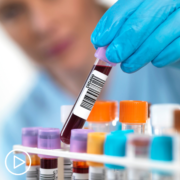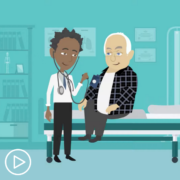What Could Metastatic Breast Cancer Genetic Testing Advances Mean for You?
What Could Metastatic Breast Cancer Genetic Testing Advances Mean for You? from Patient Empowerment Network on Vimeo.
How do genetic testing advances impact metastatic breast cancer patients? Dr. Julie Gralow discusses these advances, including treatment developments, and the importance of retesting over time.
Dr. Julie Gralow is the Jill Bennett Endowed Professor of Breast Medical Oncology at the University of Washington, Fred Hutchinson Cancer Research Center, and the Seattle Cancer Care Alliance. More about this expert here.
See More From INSIST! Metastatic Breast Cancer
Related Resources:

How Genetic Mutations Affect Metastatic Breast Cancer Disease Progression and Prognosis |

Factors That Guide a Metastatic Breast Cancer Treatment Decision |

|
Transcript:
Katherine:
What advances have there been in testing?
Dr. Gralow:
Well, it used to be – just going back a couple of years ago – that we didn’t do a lot of this genetic testing or genomic profiling of the tumor because we didn’t have many – the term is an “actionable mutation.” So, if we found something, would we do something with it? Did we have a drug we could use to do it? But, more and more and more, even in breast cancer, we’re finding actionable mutations that would drive therapy.
For example, in estrogen receptor positive breast cancer, we have a new class of targeted therapies called PI 3-kinase inhibitors – a drug called alpelisib or Piqray was approved in the last couple of years in that category – and it only is effective in estrogen receptor positive breast cancer that has a mutation in the PI 3-kinase gene. So, that would be something we’re looking for in the tumor’s genes, and actually, we need to know that there’s a mutation to even get the drug approved for treatment because it doesn’t work if you don’t have that mutation.
Increasingly, we’re finding some changes that can happen in the estrogen receptor gene and the HER2 gene, interestingly, so that you can have estrogen receptor expressed on your tumor, but over time, that tumor might develop an estrogen receptor mutation so that it stops responding to certain drugs that target the estrogen receptor.
And so, that’s called an ESR1. That’s the name of the estrogen receptor gene – an ESR1 mutation – and that would tell me probably not going to respond as well to a drug in the class we call aromatase inhibitors, but might respond better to a drug in the class that we call the selective estrogen receptor degraders like fulvestrant or Faslodex, is the name of a drug in that class.
We’re also finding that you can have what we call activating mutations in HER2, and they can be present whether the tumor overexpresses HER2 or not, and we’ve got some ongoing clinical trials looking at if the tumor doesn’t have extra HER2 on its surface – so, it doesn’t have extra HER2 protein, but at the gene level, it’s got an activated HER2 gene – we can use certain types of HER2 therapy to treat it, and we’re testing that right now in clinical trials.
So, could we even use some HER2 drugs even though technically, the tumor would be classified as HER2 negative? So, fascinating increasing information that we’re understanding, and I also mentioned before we can inherit mutations in genes such as BRCA1 and 2, but fascinatingly, the tumor can acquire those mutations. Even if we didn’t inherit a mutation, we can see mutations in the BRCA1 and 2 gene – we call those somatic as opposed to germline mutations. So, “germline” means it’s in every cell in your body, but “somatic” means the tumor somehow acquired this over time.
And so, we’ve done – we just presented some very early results of a trial, and we’re expanding this trial, looking at if you didn’t inherit a BRCA1 or 2 mutation, so technically, you don’t qualify for a PARP inhibitor, but if the tumor acquired a mutation and we can prove that with testing the tumor’s DNA, then we have seen responses from these PARP inhibitors, so that opens up another whole class of treatments, and there are other DNA repair genes that actually may be qualified as well that we can inherit or that can be acquired by the tumor.
So, more and more, we’re doing this genomic profiling, and it is leading to results that would give us possible treatment options.
Katherine:
Dr. Gralow, the goal of this program is to provide the confidence and tool for patients to advocate for the essential tests to get best care personalized to them. Are there specific tests that patients should make sure they have?
Dr. Gralow:
Well, there are a lot of assays out there to do this genomic profiling or genetic testing of the tumor, so I don’t promote any one. Various institutions do it and do it well, various companies do it, but I think every metastatic patient should have the tumor looked at in this kind of profiling.
I also think every metastatic patient should advocate for having a biopsy of their cancer, and if a biopsy cannot be done safely in the recurrence, then see if they could get a liquid biopsy – have blood drawn to find it. So, I think that patients should be asking about this. Sometimes, insurance won’t always cover it, and so, my job as a treating physician is to advocate for that, to do an appeal.
More and more, because we have so many actionable mutations in breast cancer now, I’m not having insurance decline, but occasionally, it does, and then it’s our job as the healthcare providers to make the case that yes, this will impact the patient, and yes, it should be covered by insurance.










